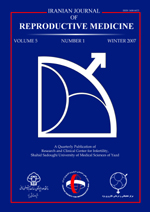
|
International Journal of Reproductive BioMedicine
Research and Clinical Center for Infertility, Shahid Sadoughi University of Medical Sciences of Yazd
ISSN: 1680-6433
EISSN: 1680-6433
Vol. 13, No. 3, 2015, pp. 135-140
|
 Bioline Code: rm15019
Bioline Code: rm15019
Full paper language: English
Document type: Research Article
Document available free of charge
|
|
|
International Journal of Reproductive BioMedicine, Vol. 13, No. 3, 2015, pp. 135-140
| en |
Types of reproductive disorders in underweight and overweight young females and correlations of respective hormonal changes with BMI
Aladashvili-Chikvaidze, Nutsa; Kristesashvili, Jenara & Gegechkori, Manana
Abstract
Background: Higher risks of reproductive problems have been found in underweight and overweight women with rapid weight gain or loss but evidence is inconsistent especially in relation to the effect of age of body weight changes.
Objective: The aim of our study was to detect the peculiarities of menstrual function, prevalence of different types of reproductive disorders and correlations of respective hormonal changes with body mass index (BMI) in young female patients with thinness or obesity since childhood.
Materials and Methods: In this prospective cross-sectional study 48 underweight and 55 overweight/obese young women with different reproductive problems underwent complete clinical and hormonal analyses. All 103 patients had weight problems since childhood.
Results: Polycystic ovarian syndrome and metabolic syndrome was the most frequent in overweight and obese women, whilst non-classical congenital adrenal hyperplasia and ovarian dysfunction prevailed in underweight women (p˂0.001). No difference was determined according to the age of menarche (p=0.885) and types of menstrual disturbances (p=0.34) between the study groups. Hypogonadotropic hypogonadism was not found in young women who were lean since childhood. Follicle-stimulating hormone (FSH) (p=0.013) and sex hormone binging globulin (SHBG) (p˂0.001) levels were higher in women with low BMI, whilst free testosterone (FT) (p=0.019) and total testosterone (TT) (p=0.003) levels were higher in high BMI participants. BMI negatively correlated with FSH (p=0.009) and SHBG (p=0.001); and positively correlated with FT (p=0.001) and TT (p=0.002).
Conclusion: Peculiarities of menstrual function and hormonal changes in young women with thinness or obesity since childhood are related to the types of reproductive disorders and their childhood BMI.
Keywords
Body mass index; Body weight changes; Childhood obesity; Thinness; Reproductive health
|
| |
© Copyright 2015 - Iranian Journal of Reproductive Medicine
Alternative site location: http://www.ijrm.ir
|
|
